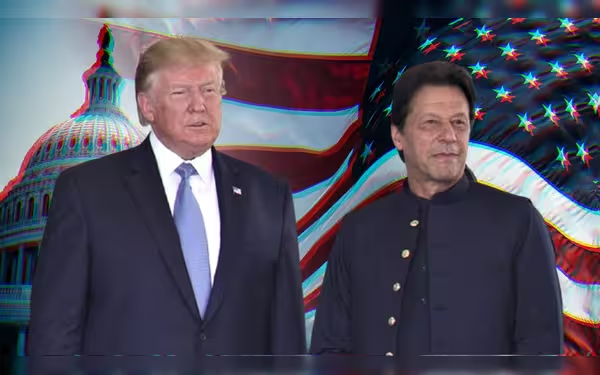Thursday, November 7, 2024 03:24 AM
Trump's Influence on Imran Khan's Imprisonment
- Imran Khan's supporters seek Trump's intervention.
- Trump has not publicly addressed Khan's situation.
- U.S.-Pakistan relations complicate potential advocacy.
 Image Credits: en.dailypakistan.com.pk
Image Credits: en.dailypakistan.com.pkSupporters of Imran Khan hope for Trump's influence to secure his release from jail amid complex U.S.-Pakistan relations.
In recent months, the political landscape in Pakistan has been shaken by the imprisonment of former Prime Minister Imran Khan. His supporters, particularly those in the Pakistan Tehreek-e-Insaf (PTI) party, have been vocal about their desire for his release. As the situation unfolds, many are looking towards international figures for support, and one name that frequently comes up is that of Donald Trump, the former President of the United States.
Imran Khan, who served as Prime Minister from 2018 until his ousting in April 2022, has garnered a significant following not only in Pakistan but also among the Pakistani diaspora in the United States and other countries. His supporters believe that Trump, with his considerable influence and connections, might advocate for Khan’s release. This hope is fueled by the fact that both leaders share a populist approach to politics and have attracted passionate followings.
However, despite the fervent hopes of Khan’s supporters, it is important to note that Donald Trump has not publicly addressed Khan’s situation during his current presidential campaign. This silence raises questions about the extent of his willingness to intervene in foreign political matters, especially when it comes to a country like Pakistan, which has a complex relationship with the United States.
The dynamics of international politics are often unpredictable. While many supporters of Khan are optimistic about the potential for Trump to leverage his influence, it is crucial to understand that political advocacy is not always straightforward. Trump’s focus may be directed towards domestic issues, and his past actions suggest that he prioritizes his political agenda over international concerns.
Moreover, the relationship between the United States and Pakistan has historically been complicated, characterized by periods of cooperation and tension. Any attempt by Trump to intervene on Khan’s behalf would need to navigate these intricate diplomatic waters. It is also worth considering that the political climate in the U.S. is currently charged, with various issues demanding the attention of its leaders.
While the hope remains alive among Imran Khan’s supporters that Donald Trump could play a role in securing his release, the reality of international politics suggests that such an outcome is uncertain. The situation serves as a reminder of the complexities involved in global political relationships and the challenges faced by leaders in advocating for foreign allies. As the story continues to develop, it will be interesting to see how these dynamics unfold and what impact they may have on both Khan’s future and U.S.-Pakistan relations.













